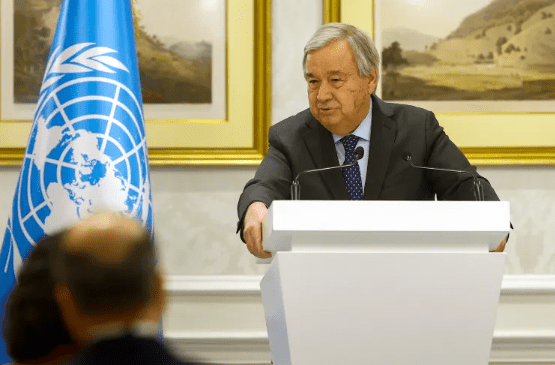“Unacceptable” are the Taliban’s demands to attend a UN conference, according to Guterres

The Taliban has set unacceptable conditions for attending a United Nations-sponsored meeting about Afghanistan in the Qatari capital, Doha, UN Secretary-General Antonio Guterres says.
“I received a letter [from the Taliban] with a set of conditions to be present in this meeting that were not acceptable,” Guterres said at a news conference on Monday.
“These conditions denied us the right to talk to other representatives of Afghan society and demanded a treatment that would, to a large extent, be similar to recognition,” the UN chief added.
The two-day meeting which ended on Monday in Doha brought together member states and international envoys to Afghanistan to discuss an array of issues facing the country. But the Taliban didn’t attend because its demands were not met.
The Taliban took over Kabul in August 2021 after United States and NATO forces withdrew following two decades of war.
However, no country recognises it as Afghanistan’s government, and the UN has said that recognition is almost impossible while bans on female education and employment remain in place.
The biggest point of contention between the international community and the Taliban are the bans imposed on women and girls.
Since it retook power, it has ordered women to cover up when leaving home, stopped girls and women from attending high school and university, and banned them from parks, gyms and public baths.
The Taliban insists the bans are a domestic matter and reject criticism as outside interference.
Guterres said it was essential to revoke the restrictions.
In January, Taliban chief spokesperson, Zabihullah Mujahid, said the UN preoccupation with Afghan women was unwarranted and dismissed its concerns.
“Afghan women wear hijab of their own accord,” he said on X. “They don’t need to be forced. The Vice and Virtue Ministry hasn’t forced anyone [to wear hijab] either.”
Another point of contention is the appointment of a UN special envoy in the country, which the Taliban opposes.
On Monday, Guterres said there needed to be “clear consultations” with the Taliban to have clarification of the envoy’s role and who it could be to “make it attractive” from the Taliban’s point of view.
He said it was in the Taliban’s interests to be part of the consultations.
Many governments, international organisations and aid agencies have cut off or severely scaled back their funding for Afghanistan in response to the Taliban policies, causing a serious blow to the country’s struggling economy.
“One of our main objectives is to overcome this deadlock,” Guterres said, explaining that a roadmap needed to be created in which “the concerns of the international community” and the concerns of the “de facto authorities of Afghanistan” are taken into account.
Lotfullah Najafizada, CEO of Amu TV, an international media outlet, told Al Jazeera the Taliban made a strategic mistake by not attending the talks.
“I think it is very important also for the Taliban to understand where the world stands. At the moment the world has planned to go ahead without the Taliban, which is not something that they expected,” he said.
“I think it is very important for the international community to build consensus and deal with the Taliban with one voice.”
The meeting in Doha also aimed at a more coordinated response to tackle issues in Afghanistan.
Guterres said there had been discussion of a “contact group”, with a “limited number of states able to have a more coordinated approach in the engagement with the de facto authorities”.
He said this could include permanent members of the UN Security Council, neighbouring countries and relevant donors but it would be “up to member states to decide how to create it”.
“I believe it would be a way to have coherence in the way the international community is engaging with the de facto authorities of Afghanistan,” he said.






